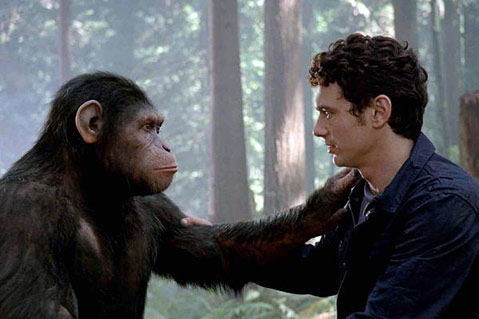Rise of the Planet of the Apes
James Franco, Andy Serkis, and Freida Pinto star in a film written by Rick Jaffa and Amanda Silver and directed by Rupert Wyatt.

They saved the best blockbuster for last. Much like J.J. Abrams’s 2009 Star Trek, this genius prequel brings surprising intelligence and unexpected thrills to a project that might have simply filled in blanks previously left to fans’ imaginations (though it’s doubtful that a cadre of nerdy enthusiasts holds Charlton Heston in the same breathless esteem Trekkies reserve for Shatner and Nimoy). Yet Rupert Wyatt’s nimble film treats the whole Planet of the Apes universe with deep respect, managing to believably serve up an Earth dominated by those “damn, dirty apes” on a delicious crust of engaging sub-themes and moments of ape-pocalyptic delights.
Caesar, for instance, is a chimpanzee granted the double-edged gift of thought via researcher Will Rodman (James Franco), a latter-day Frankenstein dabbling on God’s playground. As electronically “portrayed” by the great Andy Serkis (Gollum, King Kong), Caesar steals the show, chimp-swinging his way through his two-story tract home. And then there are those dewy human eyes. Wyatt takes it further than fun, though. This imposition of human on animal begins to imply deeper stuff about race and imperialism, and Wyatt subtly extends that to the human interactions, like Rodman’s interactions with his black British boss shot in overlapping imagery. Likewise, city and forest constantly contrast. The film’s last scenes offer us a view of sparkling San Francisco from the top of a redwood tree: two versions of the human home.
But the best aspect of Rise is its compelling pace. The first half hour gets right to the point, but then Wyatt slows down the plot machinery, allowing us to discover each human and ape individually. When the battle comes, we’re torn. One wag suggested there should be a line at the end of the credits promising, “No humans were hurt in the making of this movie.” This is mostly true. Though it’s a tale of aggression, oppression, and violent release, nary a drop of blood is shown. Turns out you don’t need carnage when your story has this much heart.



